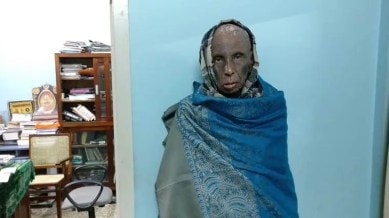Stay updated with the latest - Click here to follow us on Instagram
Justice K S Puttaswamy, key petitioner in right to privacy case, passes away at 98
Appointed as a judge in the Karnataka High Court in 1977, he served as a judge until his retirement in 1986.

Justice K S Puttaswamy, former Karnataka High Court judge and the lead petitioner in the seminal ‘right to privacy case’, passed away on Monday, at the age of 98.
Justice Puttaswamy, who was born in 1926 near Bengaluru, enrolled as an advocate in 1952 after studying at Maharaja College in Mysuru and the Government Law College in Bengaluru. He practised at the Mysore High Court before it came to be known as the Karnataka High Court and would go on to become an Additional Government Advocate before being appointed as a judge of the Karnataka High Court on November 28, 1977.
monthly limit of free stories.
with an Express account.
Following his retirement in 1986, he was appointed as the first Vice-Chairman of the Bengaluru bench of the Central Administrative Tribunal. He also served as the chairperson of the Andhra Pradesh backward Classes Commission.
In 2012, at the age of 86, Justice Puttaswamy would be one of the first litigants to challenge the Aadhaar scheme when it was still an initiative of the UPA government at the Centre. As a part of his challenge to the Aadhaar scheme, however, the Supreme Court in 2015 decided it must look at whether citizens have a fundamental right to privacy under the Constitution of India. This led to a historic decision in August 2017 where a nine-judge bench unanimously recognised the fundamental right to privacy in the case of Justice K S Puttaswamy (Retd.) v. Union of India.
The day after the verdict was delivered, Justice Puttaswamy in an interview to The Indian Express at his home in South Bengaluru, had said that the verdict was “correct and beneficial”. On the hearings, he had said “I was expecting a fair-minded judgment when the arguments were on, particularly because attorney general K K Venugopal first argued that the right to privacy was not a fundamental right but then came around to the point that it was. The possibility of the court accepting the right to privacy as a fundamental right was very bright after this.”
“During discussions with some of my friends, I realised that the Aadhaar scheme was going to be implemented without the law being discussed in Parliament. As a former judge, I felt the executive action was not right. I filed the petition because I felt that my right was affected,” he said.